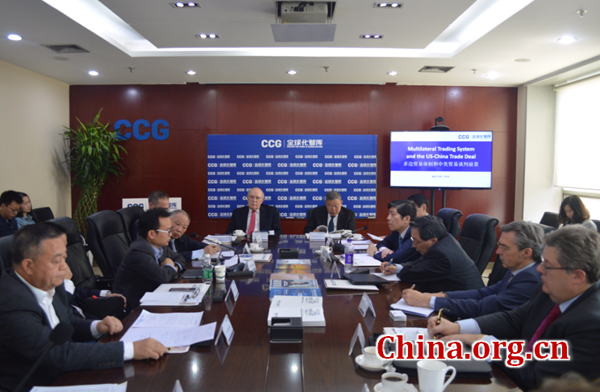WTO reform: How to accommodate concerns of different parties?
- By Zhang Liying
 0 Comment(s)
0 Comment(s) Print
Print E-mail China.org.cn, April 18, 2019
E-mail China.org.cn, April 18, 2019

A growing backlash against economic globalization and the resurgence of unilateralism and protectionism have added a new urgency to the reform of the World Trade Organization (WTO), which now stands at the heart of the rules-based multilateral trading system.
However, the effort to improve the 164-member organization established in 1995 will not be easy as there have been wide-ranging concerns aired by different parties.
Speakers at a round-table discussion on Monday held by the Center for China and Globalization shared their views on the complexity of reform and the action needed to better promote global free trade.
Amb. Terry Miller, former ambassador of the U.S. to the U.N., said that one of the problems with the WTO is the concept of special and differential treatment (SDT).
He said that the WTO's predecessor, the General Agreement on Tariffs and Trade (GATT), was designed to serve the U.S. and its major trading partners, which were already engaged in some degree of trade at that time.
Miller argued that those trading economies benefitted enormously from the disciplines imposed by the GATT. It aimed to control the tendency to enact protectionist measures, but this was not applied to developing countries.
"As for the things that were the most benefit to us, we did not impose as requirements on the developing countries. I think that was a tremendous disservice to them," he said.
Amid huge changes in how the global economy is organized, reform of the WTO requires a transformation in many countries' understanding about the nature of trade negotiations and the benefits of trade, Miller continued.
"Trade negotiations are now perverse, with each country bringing protectionist measures to the table and saying 'I'm going to hold on to these, but I'll negotiate my protectionist measures away if you negotiate your protectionist measures away'," he said.
He warned that "unless we get over the hump in terms of understanding that in trade, it's imports rather than exports that are the main benefits, we are going to have a very difficult time."
Chong Quan, former Chinese vice minister of commerce, said that the basic principles and core values of the WTO must be adhered to in the reform process.
He said that the needs of countries at different development stages should be considered, and therefore, the SDT principle for developing countries should be upheld.
Very hard negotiations lie ahead, with different countries taking different positions, such as the U.S. concern about the SDT and the European Union's focus on subsidies and transparency, Chong added.
He expressed the hope that with a forward-looking vision, the parties concerned can find the broadest possible common ground and work together to make the WTO fairer, more equitable, non-discriminatory and transparent.
Tu Xinquan, dean of the China Institute for WTO Studies at the University of International Business and Economics, said that the classification of more than 100 developing countries posed by many developed nations is not constructive or feasible, but likely to create more conflicts.
He said that WTO members should forget about the definition of developed and developing countries, and just make requests for special treatment on specific issues in accordance with their own development level.
As the future of the WTO now hangs in the balance, hopes are being pinned on this year's Group of 20 (G20) summit scheduled for late June in Osaka, Japan.
The G20 said in its declaration concluding the 2018 summit in Buenos Aires that they support the necessary reform of the WTO to improve its functioning. They added that they will also review its progress at the next summit.





